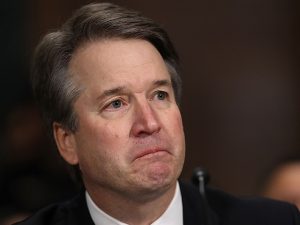Guilty until proven innocent
November 7, 2018
In July of 2018, psychology professor Dr. Christine Blasey Ford sent an anonymous note to the Washington Post, concerning Judge Brett Kavanaugh, a name swirling around on President Trump’s shortlist of nominees for Supreme Court Justice. She also reached out to her representative, Anna Eshoo.
Dr. Ford accused Justice Kavanaugh of locking her in a bedroom during a party in the “early 80s” and groping her. She says that Justice Kavanaugh’s friend, Mark Judge, was also in the room and witnessed the event. Both Mr. Judge and Justice Kavanaugh did not remember such an event. Additionally, Dr. Ford claimed that her friend Ms. Kaiser was also at the event. Ms. Kaiser, however, had no recollection of the party.
In late July, Eshoo’s letter reached California Senator Dianne Feinstein. Unfortunately, despite Dr Ford’s request, Senator Feinstein revealed the letter right before Justice Kavanaugh’s nomination. In doing so, she violated Dr. Ford’s request for privacy and made the accusation public. Instead of letting President Trump know privately and conducting an early investigation on Kavanaugh’s nomination, Senator Feinstein used the letter of alleged sexual assault to delay the nomination.
Instead of destroying Justice Kavanaugh’s name publicly and delaying his seat based on non-concrete evidence, Senator Feinstein should have told President Trump prior to his nomination of Justice Kavanaugh. Then, Dr. Ford’s wishes would have been honored and the confirmation of a Judge to the Supreme Court would not have become a controversial, politicized ordeal. A proper and thorough investigation of Justice Kavanaugh could have been conducted, and Dr. Ford’s wishes of anonymity could have been ordered. Maybe then, someone accused of sexual assault would not be on our Supreme Court.
In a court of law, prosecutors are required to provide a burden of proof, and until it is provided, the accused party retains the benefit of the doubt. Obtaining credibility is very important in creating a strong case, but it is also very difficult. The Constitution states that everybody is entitled to due process which includes the presumption of innocence. “No person shall be held to answer for capital… nor be deprived of life liberty or property without due process.” Unfortunately, this is a damning reality Dr. Blasey Ford and the prosecution were unable to address.
On September 27th, the closest substitute to evidence brought to the hearing was Justices Kavanaugh’s high school yearbook. Unfortunately for Senator Sheldon Whitehouse and the would-be prosecution, no evidence against Kavanaugh came from his explanation of the yearbook markings. In the end, no solid evidence was able to prove Kavanaugh guilty, and as the witch hunt continued, Kavanaugh’s image was progressively tarnished.
In a court of law where the accused are guilty until proven innocent without a reliable alibi, it is seemingly impossible to prove one’s innocence. It is inherently more difficult for a defendant to prove they did not do something than for a prosecutor to make a claim. Donald Trump referred to this situation as “dangerous,” and it is the reason why the Constitution requires witnesses or a confession.
Luckily for the integrity of the court system, the majority vote and lack of evidence protected Kavanaugh’s seat on the Supreme Court. Ben Shapiro makes the point that without the internet and the accessibility of the case, Kavanaugh would have been deemed guilty. His argument highlights a deeper issue within the hearing, which is the distortion of justice due to a political incentive.
If Feinstein had followed Dr. Ford’s wishes, the benefits would have been two-fold. Instead of Justice Kavanaugh and his family being humiliated nationally on possibly false charges, the FBI would have been able to investigate the case without a national spectacle being created. Additionally, Dr. Ford would not be in the public eye, as she wished. She, along with Justice Kavanaugh and his family, have faced numerous death threats and threats of attacks. This result would not have happened, had Senator Feinstein honoured Dr. Ford’s wishes.
Moreover, by deciding to use Dr. Ford’s letter as an 11th-hour tactic, Senator Feinstein increased the divide between Democrats and Republicans-making a partisan circus out of a Supreme Court nomination.
In short, Dr. Ford’s efforts are commendable: no victim of sexual assault should be silenced. Nonetheless, no victim of sexual assault’s story should be used for partisan politics: look out for Americans, Senator Feinstein, not just for yourself.


